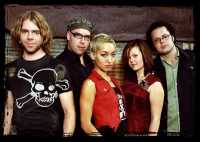The five practiced, risk-taking twenty-something musicians and singers who make up this singular new band out of Winnipeg, Manitoba will, if asked, good-naturedly toss out some of the attempts at labels astonished listeners have turned to…In the two years that they've been a unit, many have tried to describe The Duhks' music-- "contemporary acoustic," "progressive soul-grass," and “kick-ass rock/folk fusion” being just a few of the attempts to classify the group.
There are elements appropriated from Irish fiddle tunes, Canadian French and Scots/Maritime folk, and Appalachian Old Time string band in their high-energy music--but from the first sight of The Duhks (pronounced as in "That's Just Ducky" and "Ducks a' L'Orange"), you know that no stab in the classifying dark can quite capture the synthesis and musical attack of this crew.
That phrase "contemporary acoustic" doesn't readily suggest-- until the moment you see The Duhks enter and go at it, live --a drummer (Scott Senior) pounding dance rhythms, even graceful salsa polyrhythms, on a handmade cajon drum right out of Havana, or a striking, soulful singer up front (Jessica Havey) awash in tattoos, cooing, crying and shouting like a punk rock-era Gladys Knight--or India.Arie. That their salsa and soul regularly intertwine with turns on banjo (Leonard Podolak), fiddle (Tania Elizabeth) and guitar (Jordan McConnell) out of traditional instrumental folk music only underscores that this band is essentially something else again, with sounds of their own making, working a potent new North American vein of World Music.
Festival fans have been found dancing and banging on the front of the stage during their sets, in spontaneous full-on, working mosh pits. For all of the delicacy that The Duhks bring to their quieter tunes and all the swing that drives their jazzier ones, the full-throttle force they bring to the whole endeavor yields something very much like acoustic rock and roll.
This striking mélange was captured in the studio for all to hear on their new, self-titled CD, their first with Sugar Hill, produced by that storied master of the unexpected traditional and of-the-moment mix, Bela Fleck with Gary Paczosa, one of Nashville’s most in demand engineers/producers.
The disc features surprising, inventive musical turns on traditional tunes as hoary as "The Wagoner's Lad," original instrumentals that firmly mine the Celtic and old-time traditions with enough knowledge and respect to get playful --or frenetic-- with them and the Duhks interpretations of new material from songwriters as diverse as Leonard Cohen, Paul Brady, and Sting.
Havey makes the traditional "True Religion" ("Who's gonna make up my dying bed?," it asks) a deep gospel blues excursion--but the track is laced with the danceable slaps of Senior's drum and tasty commentary of Elizabeth's jazz violin. Podolak's vocal brings to that other Canadian Leonard, Leonard Cohen's "Everybody Knows" an intense, beatnik off-handedness that might be at home on an old Dave Van Ronk or even Allen Ginsberg LP--but the track is tightly focused and forwarded by his own always surprising clawhammer banjo picking, Elizabeth's gypsy violin, and the driving drum and guitar rhythm section. When the song says "Everybody knows it's moving fast," this time it's not kidding.
Most irresistible of all, arguably, and perhaps the best example of what happens when all the streams in The Duhks' sound flow together into one potent piece of hydraulics is their rendering of their friend Dan Frechette’s "Mists of Down Below," a track as dark and mystical as its title suggests--built on old timey tones, spooky, rising violin fills and solos, incessant hand slap-drumming, and a memorable vocal by Jessica that rides that rhythm.
The band itself, like the sounds The Duhks create, came together by a combination of planning and happenstance. Founder Leonard Podolak set out to bring together a group of musicians who could create a new sound with traditional roots. Each of their distinct individual styles (blues, salsa, old-time, celtic, Scots-Metis) collide with surprising fluidity and form something fresh and unexpected.
As Leonard put it, "Folk music is supposed to be the music of the people, right? Well, 'the people' are what you see all around, and part of what makes our music is mainstream music. The world is changing. The people in the audience might be listening to Eminem two minutes before they listen to us. We want to redefine not just 'folk', but what ‘pop’ music can be. It doesn't necessarily have to be all drum machines and synthesizers, or electric guitars. We play pop music on these acoustic instruments."
What they play together, they all say, finally, is best defined as "what we like." And they're not without ambition for where they'd like to take those sounds they care for so apparently.
Source: http://www.duhks.com/index.php
